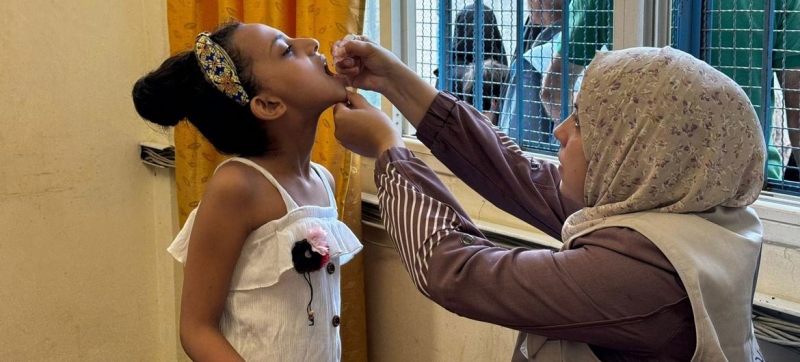
In central and southern Gaza, 442,855 children under 10 have been successfully vaccinated since October 14. UN calls for Gaza vaccination campaign to be completed on World Polio Day Health
A humanitarian pause is needed in the Gaza Strip, which is currently under threat from the spread of polio, to complete the vaccination campaign, said Louisa Wateredge, spokesperson for the UN Refugee Agency (UNRWA). Her comments came on World Polio Day, which is marked on October 24.
The third and final phase of the second round of polio vaccinations, which was supposed to begin in the northern part of the Strip more than 24 hours ago, had to be postponed due to escalating violence, intense bombing, mass evacuation orders and the lack of guaranteed humanitarian pauses. Israel has intensified its offensive in northern Gaza, claiming that Hamas militants are using the area to regroup.
“It is imperative that we stop the polio outbreak in Gaza before the virus spreads and more children are paralyzed,” Wateridge said.
“The vaccination campaign in the north must be facilitated by introducing humanitarian pauses,” she added.
To interrupt transmission, at least 90 percent of all children in every district of Gaza must receive a second dose of the vaccine. The first round of vaccinations last month was successful.
“Current conditions, including ongoing attacks on civilian infrastructure, continue to threaten people’s safety and mobility in northern Gaza. This prevents families from bringing their children for vaccination,” Wateridge said.
A total of 120,000 children in the northern Strip are scheduled to be vaccinated. In the central and southern Gaza Strip, 442,855 children under 10 years of age have been successfully vaccinated since October 14, representing 94 percent of the target in these areas.
Conflict-related disease rates double
The United Nations Children’s Fund (UNICEF) warns that the number of polio cases in fragile and conflict-affected countries has more than doubled in the past five years. In 2023, these countries were home to 85 percent of children affected by the disease.
Of the 21 countries currently battling polio, 15 are affected by conflict or instability, including Afghanistan, the Democratic Republic of the Congo, Somalia, South Sudan and Yemen.
A report released by UNICEF on World Polio Day says the proportion of children receiving polio vaccinations has fallen from 75 to 70 percent, far below the 95 percent target needed to achieve immunity in a community.
“In many countries, we are seeing health systems collapse, water and sanitation infrastructure deteriorate, and displacement of families, leading to the resurgence of diseases like polio,” said UNICEF chief Catherine Russell.
“The spread of polio not only puts children in affected countries at immediate risk, it also poses a growing threat to neighbouring countries. The last push is the hardest, but now is the time to act. We must not stop until we have made polio safe for every child, in every corner of the world, once and for all,” she added.
